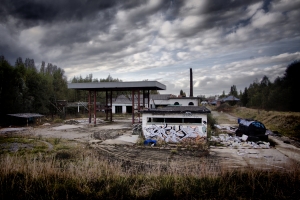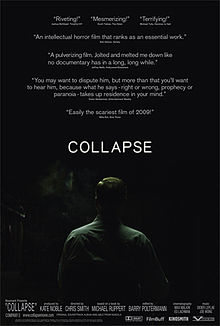Collapse is the story of how modern society could probably take a drastic turn for the worse. And it’s narrated by Michael Ruppert. Most people call Michael Ruppert a conspiracy theorist because they don’t like his ideas, because they don’t fit into their picture-perfect world, and most definitely because if Ruppert is right in the avant-garde documentary Collapse then society is on the verge of experiencing one of the most radical changes in human history. What is this change that Collapse and, more importantly, Michael Ruppert talks about? Modern society regressing perhaps hundreds of years into the past. Why? Because for the past two hundred years, i.e. post-Industrial Revolution, we’ve year by year exceedingly and progressively started to use up all of earth’s resources as if they were self-regenerative (instantly at least) and infinite when they are not.
Granted, Ruppert may very well be paranoid. If you look at his background, though, it kind of makes sense. He comes from a lineage steeped in governmental conspiracy, with both parents at one point or another in the CIA, and he himself a LAPD officer early in his career before being approached by the CIA to run drugs over the border into the States. When he refused the CIA’s offer, they came after him, and for awhile he had to constantly look over his shoulders. While perhaps not as good looking as Matt Damon, Michael Ruppert’s life could easily rival the conspiracy and corruption of Jason Bourne’s CIA. He does make some interesting points in Collapse that have yet to be addressed in modern society, and that perhaps is one of the scariest facts as we move further into this next century.
And it’s not just Ruppert. Many other social critics and scientists and politicians have been saying that while the 20th-century was all about progress and change both economically and technologically, or consumption for the sake of progress, this century needs to be more about curving that consumption and perhaps finding alternative means to live. It’s a question and problem that goes much further than paying four dollars a gallon for gas. These oil companies, whether we like it or not, do not need our money in regards to the gas we put into our cars. That’s a small fraction of their profits. Oil companies have become synonymous with modernity because everything, and I mean everything, we use on a day-to-day basis has some form of oil in it, from the pesticides they use to treat our food to tooth paste to each and every computer. It’s a staple in our society to use oil without knowing we’re using it.
It’s not a matter of just switching to alternative forms of energy and then giving ourselves a collective pat on the back. We’ve far surpassed that point. Society, in order to effect change, must radically change to the point that if it did happen, hypothetically, it would not be recognizable. No more cars or computers or televisions or cell phones—none of that. It will have to be a complete 180. And if we don’t do it willingly, then it will be forced upon us.
 It’s not a change of ideology either, like from capitalism to communism. It’s not that stupid. It’s the way we live our lives in order to keep living our lives; in order for humanity to exist at all. And as survival of the fittest has taught us, those unwilling to change will perish.
It’s not a change of ideology either, like from capitalism to communism. It’s not that stupid. It’s the way we live our lives in order to keep living our lives; in order for humanity to exist at all. And as survival of the fittest has taught us, those unwilling to change will perish.
The private sector and government won’t be able to do anything about it because they’ve been perpetuating the lie that it’s all going to be okay. Why? How? Well you got two sides: one saying that progress is the end all be all of what society needs to be about, and the other, the conservatives, that have no idea what they’re saying because they say contradictory things like, ‘We need to emulate our Founding Fathers’—as if our Founding Fathers agreed with one another—and yet they want just as much progress as the progressives do. Democrat, Republican, they both don’t work because they are based on ideological premises that have surpassed their usefulness to society since their ideas, for the most part, perpetuated the idea that infinite growth could continue with finite resources. And that is what they call an axiomatic lie. It’s not a conspiracy theory when it’s actually true.
So what’s the most important thing to take out of Collapse? Despite how many critics have interpreted it, the film is not as gloom-and-doom as it sounds. Yeah, we’re moving closer and closer to modern day society collapsing every single day. But as soon as we realize certain self-evident facts, then we can move on from there and take a different path in human history so that the collapse is cushioned by obviating policies. Policies that will not come out of the BS circulating Washington, Wall Street, or your local business district, but actual ingenuity and individual persistence and creativity is what will help us prevent the present-day course of a collapse.
Collapse,




